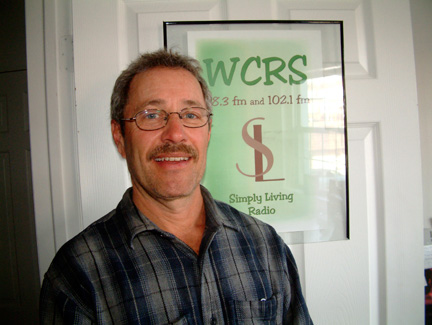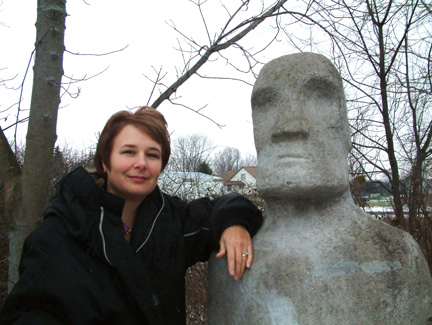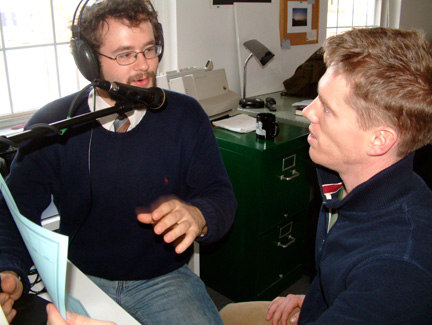
Columbus, Ohio USA
RETURN TO HOMEPAGE www.shortnorth.com
Columbus Community Radio Takes Off in '08
WCRS brings Democracy Now! and local voices to the airwaves
January 2008
by Jennifer Hambrick
© Photos by Gus Brunsman III
Eugene Beer, chief engineer for WCRS, first heard the Pacifica program Democracy Now!
in 2000 while in Florida and was blown away by the information that was coming out.Columbus radio listeners who want to hear more independent programming on local airwaves will have their chance this month.
WCRS, a community radio station broadcast on 102.1 and 98.3 FM, has since last May offered Democracy Now! and other nationally syndicated programs broadcast through the Pacifica Radio network, and has this month expanded its broadcast hours and schedule of locally produced programs.
The leadership of the almost all-volunteer radio enterprise hopes the progressive programming will offer Columbus an alternative to the mainstream global news reporting they say is tainted and biased by money interests. Station planners also hope WCRS’ local programming will enable under-represented communities in the Columbus area to enter dialogues on significant issues.Freedom of the Airwaves
Broadcaster and educator Ken Kraska was part of the inspiration behind the station’s coming into existence.
“My vision, and the vision of others at the time, was for an FM radio channel that would be shared by different non-profit stations, with each station maintaining its own distinct mission and timeslot,” Kraska said. “I envisioned that the stations would serve a variety of listeners in Columbus, with programs on health and sustainability as well as multicultural issues for folks from other cultures.” Embracing that vision, 102.1 FM is now shared daily between WCRX, a service of Bexley Public Radio Foundation (11a.m.-1p.m.) and WCRS, a service of Simply Living (3-8 p.m.).
Electrical engineer and musician Eugene Beer, grew wary of major media outlets in 2000 when he experienced the ballot-counting disaster of that year’s presidential election first hand while in Florida.
“I always used to be an NPR listener, but starting with the 2000 election, I really perceived that NPR was not giving us the whole story,” Beer said.
Beer suspected that National Public Radio was not able to report political news as freely as it should be able to because it is supported by agencies, like the Corporation for Public Broadcasting, that receive funding approved by Congress.
While in Florida, Beer heard Democracy Now!, a global daily news program hosted and produced by journalists Amy Goodman and Juan Gonzalez and broadcast over the independent Pacifica Radio network.
“I was blown away by the information that was coming out on how the vote counting was being mishandled and how certain votes would never count and certain votes were never recounted,” Beer said. “I became passionate about independent news media, such as Pacifica’s network.”
Democracy Now! and other Pacifica programs receive funding from individual donations and sponsorships by not-for-profit agencies, enabling the journalists and producers who create this programming to maintain their independence from political agencies they often are called to report on.
Marilyn Welker, director of Simply Living, a Columbus non-profit organization dedicated to responsible, sustainable living and the license holder of the low-power signal that broadcasts WCRS on 102.1 FM, says the Pacifica programming and the locally produced shows the station will offer are unique additions to Columbus airwaves.
“At this time there are no other on-the-air stations broadcasting Pacifica programs in Columbus,” Welker said. “There also is such a lack of voices of different perspectives relative to community service and ethnic issues and cultural celebration. It’s not on the Columbus radio stations.”
Free Speech Radio News, a daily 30-minute news show and This Way Out, a gay/lesbian/bisexual/transgender show are among the Pacifica network programs WCRS has been broadcasting in Columbus since May. The station broadcasts Democracy Now! twice daily, at 3 p.m. and 7 p.m., and plans to begin airing Pacifica’s Native American News this month on weekends.
Those in the northeast quadrant of the Columbus metro area can access WCRS’ low-power FM signal at 102.1 FM. A booster station in Grandview duplicates this broadcast on 98.3 FM, and reaches Grandview and central Columbus. Because both signals are low-power, it may require listeners inside buildings or homes (especially near downtown where other strong stations may interfere) to follow recommended guidelines to pick up the station. These guidelines can be found on WCRS’ Web site www.wcrsfm.org when it goes live this month.
The Puffin Foundation, a New Jersey-based non-profit organization devoted to supporting the work of socially conscious, non-mainstream artists, awarded a $9,000 grant to create the booster station. Java Kitrick, a Columbus resident and director of the foundation’s Puffin Power to the People program, said Puffin typically awards grants of only $2,500 dollars to support grassroots projects, but that the foundation nearly quadrupled the amount of money it gave to create the booster station because it believed independent radio should have a presence in Columbus – a key city in a crucial electoral state – in the run-up to the 2008 presidential election.
“We thought it was so important, since Columbus is again Ground Zero, and since we’re in the midst of the war, we thought that programming like Democracy Now! was so vital to this huge metropolitan area,” Kitrick said.
In addition, the Community Radio project received a $2000 grant in 2006 and a $1500 grant in 2007 from the Community Festival (Comfest) organization of Columbus. These grants were used to buy a transmitter, remote broadcast antennas, and studio equipment.
Beer, chief engineer for WCRS, also believes local programming on community radio will add a vital dimension to Columbus’ airwaves and says listeners will be able to relate to local radio talent.
“My perception is that people tend to trust people they know from the neighborhood perhaps more than talking heads on the TV, so that’s a big advantage of community radio: a large portion of the community will know the people on the air,” Beer said.
Peter Doyle, who as chief of the FCC’s audio division is responsible for the licensing of the 15,000-plus radio stations in the U.S., says community radio is a growing trend. There were no low-power community radio stations on the air in 2000 when rules creating low-power radio service for community broadcasting were adopted. Today slightly more than 800 of these stations are on the air in locales across the country. “This is a service in its infancy,” Doyle said.
Former FCC chairman William Kennard was the initial driving force behind making low-power frequencies available for short-range broadcast of approximately 10 miles range. Kennard wanted to encourage both local ownership of the airwaves and local radio programming.
“This was a way to promote locally produced radio,” Doyle said.
Novelist Cynthia Rosi features stories about innovative artists and people finding unique solutions to political and environmental problems on her locally produced program Conscious Voices. Columbus Grassroots Radio
In keeping with the mission of community radio to encourage local programming and the mission of Simply Living to encourage sustainable living, in November WCRS started broadcasting four locally produced programs that look at politics and environmental issues, the arts, healthy living and the Columbus cycling scene.
Columbus novelist and contributing reporter for WCRX, Cynthia Rosi, is host of WCRS’ locally produced Conscious Voices program, a weekly hour-long magazine featuring stories about innovative artists and people who have found unique solutions to political and environmental problems.
“The show is about people who are living consciously,” Rosi said. “It’s about people who say, ‘I don’t particularly like what I’ve created in my life and in my society. I’m going to stand up and change that consciously and be part of a larger change that’s happening.’ It’s listening to those voices, listening to those who are saying ‘I don’t have to live this way,’ and then listening to the larger movements saying, ‘You don’t have to live a life of mindless consumerism. You can take a different route.’ It’s those voices that I’m listening to.”
Rosi’s first shows have addressed issues of global significance, including peak oil and the genocide in Darfur. Around Thanksgiving, psychotherapist Donna Sigl-Davies appeared on the show to discuss gratitude and forgiveness in the healing process. Local poet Frank Shearer has been a guest on the show, as have members of the Grandview-based artists’ group Couchfire Collective. Rosi says future shows will address issues including climate change and the local production of food, and will showcase artists of local and international stature.
Rosi believes her show’s segments on art and artists will help listeners see the value of artistic creativity in finding meaning in their lives and in leading to solutions to the world’s problems.
“I believe that art provides levity to the show,” Rosi said. “It breaks up some of the more serious topics and says, ‘Yes, living here can be a challenge sometimes, but there’s always art, and that gives us color and beauty and joy and peace in our lives, and a way to express ourselves in the world.’ Some of our most creative and beautiful solutions start in art.”
Both the arts and community radio have held long appeal for local candle maker, ceramic artist and freelance community radio journalist Evan Davis, host of WCRS’ Your Music. The weekly show is devoted to the music of independent artists not generally heard on commercial radio stations.
This fall Davis gave the first-ever Columbus broadcast of the award-winning Carolina Chocolate Drops, an African-American bluegrass band based in Durham, N.C. In addition to its entertainment value, Davis says, Your Music fulfills another aspect of the mission of community radio.
“(Community radio) exists for the purpose of representing the under-represented constituencies in an area by giving them access to the airwaves. It’s about elevating the disparate voices of the disenfranchised to a level of parity,” Davis said.
Local chiropractor Kristopher Keller hopes that WCRS’ Simply Living Healthy program will help many who are disenfranchised from mainstream health services learn about other ways to stay healthy. Keller produces and hosts the weekly 30-minute program devoted to exploring health care and wellness practices beyond mainstream Western medicine.
“I think that with the health care system as it is, people are looking for answers as to staying healthy because it’s so expensive to get sick,” Keller said. “The focus of (the show) is to help empower people to stay healthy.”
To this end, Simply Living Healthy is devoted to exploring holistic preventive practices and “alternative” therapies. Equestrians Holly Jedlicka and Glenda Childress have discussed equine therapy on the show. Maggie McKivergin, a past president of the American Holistic Nurses Association, also has been a guest.
On future shows Western medical doctors will discuss holistic sleep aids and natural ways to maintain balanced blood sugar levels.
“There’s a lot of local talent that I don’t think people know we have here in Columbus. This is a way to let people know that they don’t have to fly to Cleveland or San Francisco to find people who are on the cutting edge of their field,” Keller said.
Zach Henkel (left), host of Cranksters, with fellow bicyclist
Austin C. Kocher, a student at OSU.In a sprawling city with a limited public transit system, the conscious decision to bike rather than drive is, to some, on the cutting edge of a transit revolution. But Zach Henkel, producer and host of WCRS’ Cranksters, says many people start biking simply because driving is too expensive.
“One reason I bike and most people do is because they don’t have much money. They’re not trying to make some sort of statement or anything. It’s usually out of poverty,” Henkel said.
Cranksters serves the interests of Columbus bikers, whatever their motivation for biking. Henkel says the show discusses news and politics affecting Columbus bikers, issues a stolen bike report and public service announcements about races and other biking events and includes guest interviews on a special “Topic of the Week.” Using bikes for taxi service and for hauling materials around town was one recent “Topic of the Week,” which Henkel discussed with Bill Carnes, the owner of an as-yet-unnamed pedicab company in Columbus, and Adam Maynard, who used to deliver sandwiches by bicycle.
The Future of WCRS
With so many media outlets vying for the public’s attention, why should radio listeners care about yet another?
Kitrick says community radio offers a perspective that can’t be found in the mainstream media.
“People who come to alternative news sources are really looking for the truth. This community radio station is going to make it easier to get different news or news that you don’t hear on the mainstream networks and progressive news.”
WCRS planners are currently ironing out the station’s programming and broadcast schedule and putting a fiscal infrastructure in place. Beer says he hopes to expand the current list of locally produced shows to include, among other programs, a morning call-in show hosted daily by rotating pairs of hosts. He also hopes 102.1 FM will one day offer round-the-clock independent radio programming – a jump from the seven hours of air time WCRS and Bexley’s WCRX currently broadcast.
“I see all kinds of synergies involving the station,” Beer said, “like bringing in speakers and special events sponsored by the radio station and that involve the community.”
WCRS planners also are discussing terms for underwriting or sponsorships with local non-profits, including the ecologically sensitive Clintonville Community Market, whose missions are in synch with those of the station’s license holder, Simply Living.
As Beer sees the station he and others have worked for almost seven years to create going up around them, he says he’s happy to share his passion for independent radio with his community.
“I’m just thrilled to be able to bring it to Columbus.”WCRS
102.1 FM
98.3 FM
LISTENER GUIDELINES at www.wcrsfm.orgPacifica Radio Network Programs
Democracy Now! • Free Speech Radio News
This Way Out • Native American NewsLocal Programs
Conscious Voices • Cranksters
Simply Living Healthy • Your Music
©2008 Short North Gazette. Columbus, Ohio. All rights reserved.
RETURN TO HOMEPAGE www.shortnorth.com


